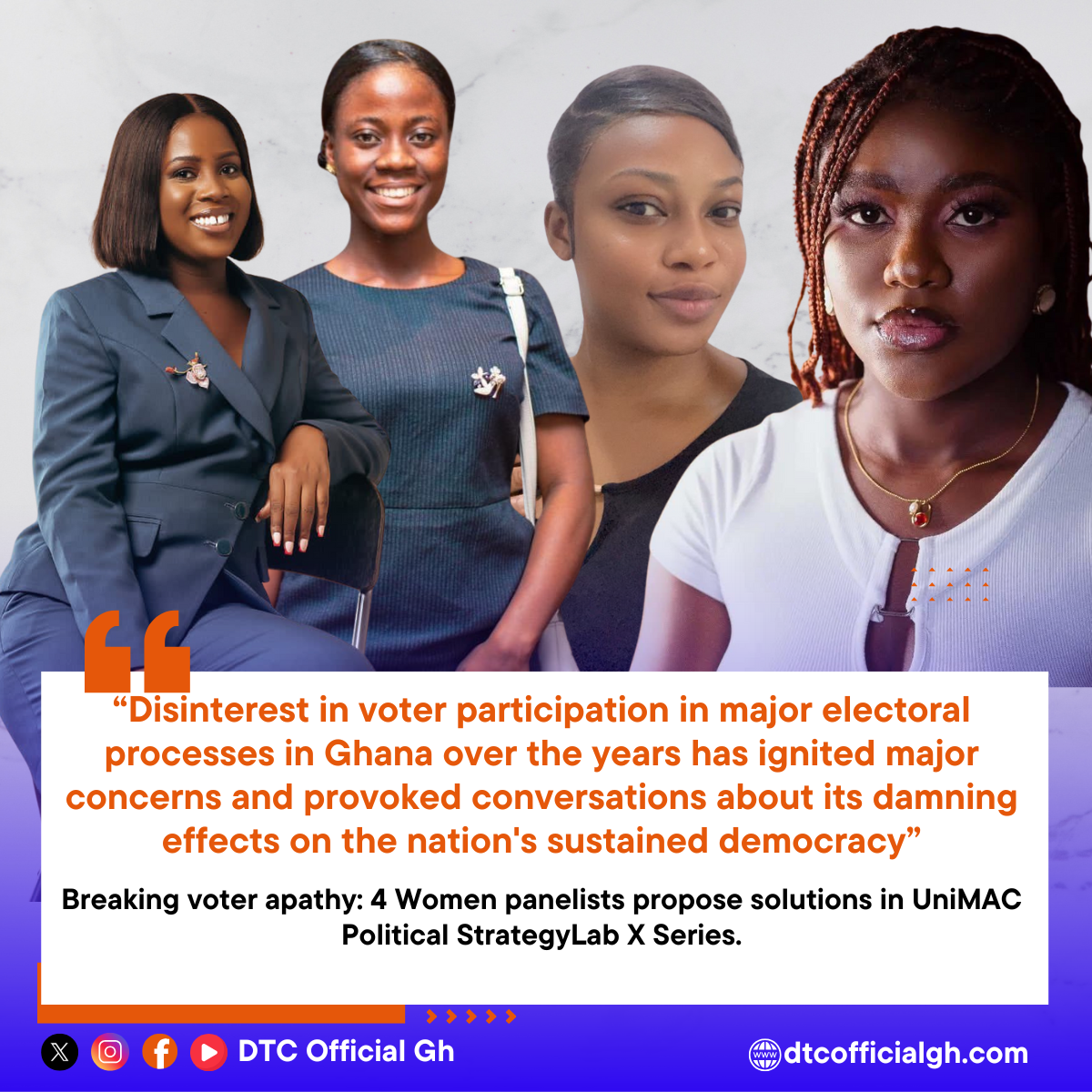Breaking voter apathy: 4 Women panelists propose solutions in UniMAC Political StrategyLab X Series

Disinterest in voter participation in major electoral processes in Ghana over the years has ignited major concerns and provoked conversations about its damning effects on the nation’s sustained democracy since the beginning of the Fourth Republic in 1992.
From 2000, the percentage of absentee voters at the polls has fluctuated, hitting its lowest during the 2024 general elections, with close to 7.4 million eligible voters (39.1 per cent of registered voters) not turning up to vote.

A recent UniMAC Political StrategyLab online poll revealed alarming voter apathy trends, with only 39.7 per cent of respondents very likely to vote, while 59 per cent cited lack of trust in candidates and 31.4 per cent expressed disillusionment as reasons for abstaining.
Political actors, experts, and stakeholders have cautioned that this development threatens to weaken the foundations of Ghana’s democracy, diminish public trust in the political system and political leaders, and deepen the already fragile sense of patriotism among citizens.
Voter apathy, a phenomenon which refers to reduced interest or enthusiasm among the eligible voter population to participate in elections and related processes, is usually characterised by low voter turnouts and could be attributed to varied causes.
In Ghana, the phenomenon is largely attributed to the insensitivity of political elites toward the concerns of citizens, unfulfilled campaign promises, corruption, scandals, nepotism, and the perceived selfishness of leaders, among other reasons.
While these issues are widespread, voter apathy is fundamentally attitudinal in nature and requires strategies that address behavioural change in order to reverse the trend.
In an attempt to propose solutions, four female panelists on Monday, August 18, used the UniMAC Political StrategyLab X Space platform to share innovative ideas aimed at tackling voter apathy in the country.
For more insights and inspiring stories, kindly follow us on Twitter and WhatsApp for more.
The panel featured Christabel Nsiah, Aaliyah Duvi-Rony, Patience Tetteh, and Antwiwaa Apenteng, with Kekeli Ocansey as the moderator.
All of them are final-year Public Relations with Marketing students at the University of Media Arts and Communications (UniMAC).
The X space series is part of the Political Marketing Term Project dubbed “UniMAC Political StrategyLab 2025” which is scheduled for September 13, 2025.
Building meaningful relationships
Ms Duvi-Rony said the youth were disenchanted with the current state of politics, indicating that politicians were not meeting their expectations.
To regain trust, she explained that politicians should engage citizens beyond election campaigns and focus on building meaningful relationships.
“One strategy is to encourage volunteerism, supporting projects and initiatives that foster a sense of community and national development.
“Creating feedback mechanisms is also crucial, allowing citizens to share concerns and grievances, and helping politicians build a positive atmosphere.
She added that implementing these approaches, politicians could demonstrate their commitment to listening and responding to citizens’ needs, ultimately strengthening their connection with the people.
READ ALSO: How One Man Is Building Africa’s Gaming Industry from Scratch
Realistic performance
Ms Nsiah stated that to genuinely engage Ghanaian youth and reduce voter apathy, political leaders must deliver realistic performance, demonstrating tangible improvements in areas like IT infrastructure and healthcare.
According to her, effective communication is key, using clear, relatable messaging that appeals to and responds to voters’ needs, both during and after elections.
She said politicians should use simple language, storytelling, and personal anecdotes to convey complex policies and create emotional connections with voters.
She said leaders must also be accessible and available to citizens beyond election seasons, fostering a sense of convenience and approachability that builds trust and enthusiasm.
READ ALSO: Youth in AI Launches Groundbreaking AI Lab at Google Research Accra
Sense of inclusivity
For her part, Ms Apenteng said politicians should organise regular campus and community forums to engage with youth, listen to their concerns, and gather feedback, fostering a sense of inclusivity and responsiveness.
“Providing skills and job programs that are sustainable and long-term can help address youth needs and concerns, as exemplified by initiatives like NABCO and John Dumelo’s programs.
“By maintaining engagement with citizens, particularly youth, beyond election seasons, politicians can build trust, understand their needs, and address them promptly, leading to more effective governance,” she said.
For more insights and inspiring stories, kindly follow us on Twitter and WhatsApp for more.
Political participation
Ms Tetteh stated that for young people to be enthusiastic about voting, the government needs to create a regulatory framework that ensures essential services like banking, security, and infrastructure work effectively for citizens.
She said when the economy was stable and fiscal policies were effective, young people are more likely to see the value in participating in politics and casting their votes, as they will feel the positive impact in their daily lives.



